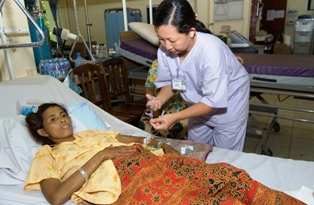Fogarty Serves as Training Ground
September - October, 2008 | Volume 7, Issue 5
In its 40 years, sometimes in the wilderness of countries Americans have never heard of doing work that garners few headlines, the Fogarty International Center has quietly and effectively trained 5,000 researchers.

Photo by David Snyder
A nurse delivers medication to a patient at Cambodia's
Sihanouk Hospital Center of Hope, where Fogarty funds
HIV research through its AIDS International Training and
Research Program.
With a mission of "training the next generation of scientists to address global health needs," Fogarty makes the most of its grants to projects that teach young scientists how to do world class research, and it funds both American and foreign investigators at institutions in the United States and in more than 100 countries.
"It is no longer a matter, if it ever was, of just bringing American know-how to less developed countries," says Dr. Kenneth Bridbord, head of the division of international training and research.
"Our grantees leave in place the administrative and medical infrastructure that will generate continuing health improvements delivered by local providers and the local scientists they train. The grantees also bring back important technical and cultural skills they could only learn abroad."
Fogarty training ground a "very rich soil"
The training portfolios--ranging from the innovative Framework grants (see the story "Framework program helps faculty cross departmental lines" on the Framework program), to the groundbreaking AIDS International Training and Research Program to the twinning of U.S. and foreign medical students in the Clinical Research Training Scholars Program--are part of what makes Fogarty different from the big-name institutes and foundations.
"They are looking for treatments and cures. We're looking for people who'll make those discoveries in their own countries," says Bridbord. Beyond altruism, training people to combat both infectious and chronic diseases in regions of the greatest need is good diplomacy, he says.
The value of the Fogarty training is measured by the legion of one-time neophytes--and still idealists--who are now among the leading public health figures in their own countries, including the heroic teams that provided mental health care to victims of the Chinese earthquake (see related story, "When Disaster Strikes, Researchers React" from May-June, 2008), and dynamic individuals like Dr. Patricia Garcia, chief of the Peruvian National Institute of Health and principal professor of public health at the Universidad Peruana Cayetano Heredia in Lima.
She likens the Fogarty training programs to a "very rich soil." "People, our trainees, are the seeds. The seeds, in a good soil, will eventually help you to have these plants, and if the plants are growing well, they eventually will have the fruits, and these fruits are these grants that people can get...to (turn) the results of research into policies that will eventually improve the public health in a country. I mean, we are not a country anymore, we are not local anymore--so, globally."
Building sustainable programs that stay in-country is one of Fogarty's aims, and during 20 years of programs in Uganda, about 200 researchers have been trained and 10,000 workshops held, says Dr. David Serwadda, dean of the Makerere University public health school in Kampala. "Whenever you train for the sake of training, you tend to lose more people, but when you train them in the setting of a research program, you tend to retain people."
Haiti, the focus of early attention on the global AIDS epidemic, has seen prevalence among pregnant women and new mothers drop from 6.6 percent to 3.1 percent in 10 years, says Dr. Jean Pape, founder of the Haitian Study Group on Opportunistic Infection and Kaposi's Sarcoma, partially funded by Fogarty's pioneering AIDS International Training and Research Program.
"For us in Haiti, Fogarty has been the cornerstone of the entire program," he says. "And it has impacted national mortality in adults and in children. There is no way we would have been where we are now without this program," he says. "This program has trained the leaders in our field, who themselves have trained thousands of others."
The Scholars Program matches U.S. students with foreign students and supports a year-long regimen at an institution in a low- or middle-income country.
Krista Pfaendler, a fourth-year medical student at the University of Pittsburgh and a former Scholar, notes that this program is unique because "you can't really do anything in three or four months," the maximum term of other sought-after awards.
The length and the cultural immersion not only provide research training and some clinical work, "it creates ongoing relationships that leave the window open for future collaboration," she says.
Another program that pays dividends to foreign countries without much cost to the Center is the Global Research Initiative Program for New Foreign Investigators, which provides partial salary for foreign researchers doing work at other NIH institutes or centers, with the proviso they return home and continue their work, with Fogarty support.
With global health increasing 57 percent as a preferred concentration for public health school students in the past 10 years, the need to at least maintain current programs is self-evident, says Dr. Peter Hotez, president of the Sabin Vaccine Institute and a member of the Fogarty advisory board.
To view Adobe PDF files,
download current, free accessible plug-ins from Adobe's website.